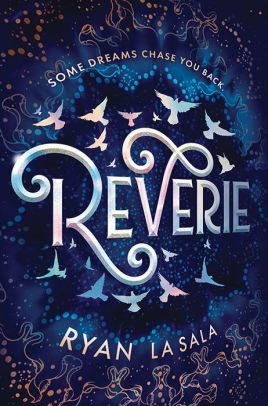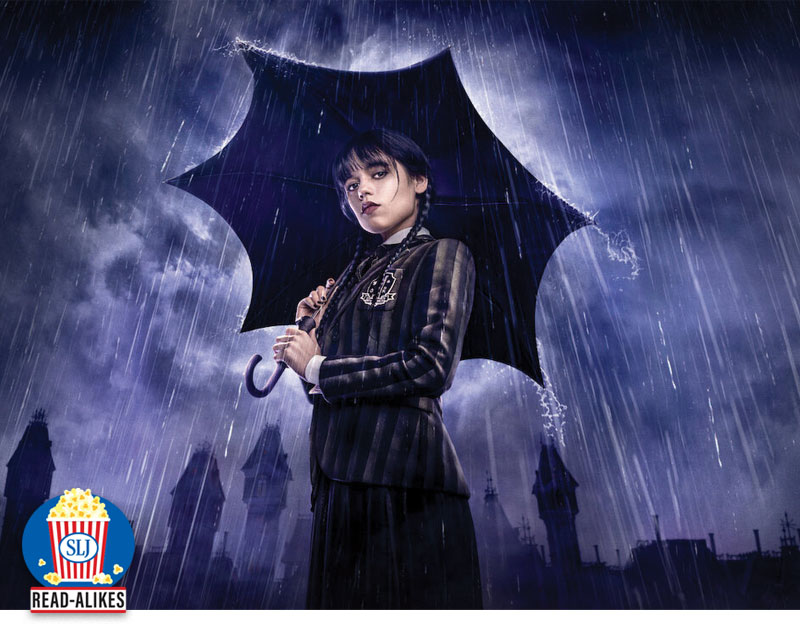Escaping from Reality Shows Us How to Change It, a guest post by Ryan La Sala

REVERIE takes place in our world. Connecticut, to be specific. It’s a version of Connecticut you’d recognize, even if you’ve only seen postcards. We have old mills and slow rivers and vibrant autumns. The usual stuff. There is, however, one major difference.
In REVERIE’s imagining, Connecticut is slowly being warped by a strange magic that mines the secret, subconscious worlds people build within themselves, and manifests those worlds in our reality. The characters refer to these phenomena as reveries, because that’s what they are: fantasies that superimpose themselves over our reality. Fantasies that entrap, and refuse to dislodge themselves from reality until they are appeased.
ADVERTISEMENT
ADVERTISEMENT
I developed the concept of the reverie around the idea of inverting escapism. Dreams are common territory in fiction, but usually as an act of solitary, inward exploration (or prophecy, if we’re being uncanny). I love those stories but my goal with REVERIE wasn’t to dig into fantasies that one could simply wake up from. I wanted fantasies that were aggressive, and moody, and dead-set on surviving once they’d been manifested. So I created a magic that gives material form to belief, and I created a magic system that gives power to those typically rendered powerless by reality.
Why?
By explanation, let me start with Kane, the unlikable hero of REVERIE. Kane uses escapism as a form of self-preservation. He is lonely and disenchanted with a reality that has been unkind to him, as reality often is to young queer. Kane withdraws into books, movies, and anything that provides a realm other than our own. And he’s content with this, until the sudden inheritance of power—and the ensuing responsibility—reveals to him how ill-equipped he is to navigate relationships, leadership, community, and other hallmarks of a hero.
With Kane, I wanted to show how a person can become so insulated by daydreams that they forget how to manage the world around them. When we withdraw, the world only notes our absence for so long. It then continues on without us, and often the things that forced us to withdraw get the luxury of continuing unchecked, as we drift further into ourselves.
Do I fault Kane for using escapism as self-preservation? Absolutely not. Fantasy’s function as refuge is very important to me. His reaction to reality is not his fault. But his inaction eventually is his fault, especially as he learns about his own ability to affect the reality around him. Eventually, running away means abandoning people he could otherwise help. Eventually, running away is not an option.
I like this journey for Kane. His path out of himself contrasts well with his adventures into the interior worlds of other people. I think his point of view enables him to be an effective narrator to drive home an important lesson.
Escapism isn’t always bad. Reality is a harsh place, and no one should be faulted for wanting a break. But there are people among the escaping ranks with power. People like Kane, who has the advantage of privilege, and stability, and—sure—magical reality bending magic. Maybe you don’t have Kane’s magic, but you do have his imagination. Lots of writers and bookish people share that. They spend hours in other worlds, analyzing system of magic, fantastical machinations, and mind-boggling world building. They — really we— are practically trained on both imagining a more fantastic world, but also manifesting it through bravery, heroics, honesty, and determination.
So escapism has its educative uses, doesn’t it? From the negative of the world, it creates a technicolor solution to the reality that necessitates it. My argument, if I have one, is that escapism can be a harbinger for change. As a reaction to reality, escapism can be the exercise of deconstructing our reality’s faults, experimenting with their improvement, and ultimately devising actionable ways to create that change in our material world. The last part, the action part, is what Kane needs to learn. As a person with power, it’s up to him to find a way to bring his reality and his dreams together; to bring his dreams home, because ultimately it is reality where he must live.
A reverie is a fantasy imposed upon reality, borne from a person’s interior world. Often that interior world is much more hospitable than the world that inspires it. Reverie’s make me think of safe spaces, of shelters, of refuge. They make me think of gay bars full of pride, and libraries full of wonder. Places where the fantasy of what the world could be like kiss against the partition of what it is.
ADVERTISEMENT
ADVERTISEMENT
So I don’t discourage dreaming. Ever. I support escapism with my whole heart. Whether for indulgence, or comfort, or thrill, I see escapism as not just necessary, but deeply practical. Because it’s escapes that help us feel safe, and coax us towards dreaming.
And, ultimately, it’s escapes that show us the work that needs doing once we’re ready to wake up.
Meet Ryan La Sala

RYAN LA SALA grew up in Connecticut, but only physically. Mentally, he spent most of his childhood in the worlds of Sailor Moon and Xena: Warrior Princess, which perhaps explains all the twirling. He studied Anthropology and Neuroscience at Northeastern University before becoming a project manager specialized in digital tools. He technically lives in New York City, but has actually transcended material reality and only takes up a human shell for special occasions, like brunch, and to watch anime (which is banned on the astral plane). Reverie is Ryan’s debut novel. You can visit him at ryanlasala.com or follow him on Twitter @Ryality.
About REVERIE

Inception meets The Magicians in this wildly imaginative story about what happens when the secret worlds people hide within themselves come to light.
All Kane Montgomery knows for certain is that the police found him half-dead in the river. He can’t remember anything since an accident robbed him of his memories a few weeks ago. And the world feels different—reality itself seems different.
So when three of his classmates claim to be his friends and the only people who can tell him what’s truly going on, he doesn’t know what to believe or who he can trust. But as he and the others are dragged into unimaginable worlds that materialize out of nowhere—the gym warps into a subterranean temple, a historical home nearby blooms into a Victorian romance rife with scandal and sorcery—Kane realizes that nothing in his life is an accident, and only he can stop their world from unraveling.
ISBN-13: 9781492682660
Publisher: Sourcebooks
Publication date: 12/03/2019
Filed under: Guest Post
About Amanda MacGregor
Amanda MacGregor works in an elementary library, loves dogs, and can be found on Twitter @CiteSomething.
ADVERTISEMENT
ADVERTISEMENT
SLJ Blog Network
At Last! Mr. Schu on The Yarn Podcast
Fuse 8 n’ Kate: Ginger Bear by Mini Grey
Exclusive: Giant Magical Otters Invade New Hex Vet Graphic Novel | News
Parsing Religion in Public Schools
ADVERTISEMENT







